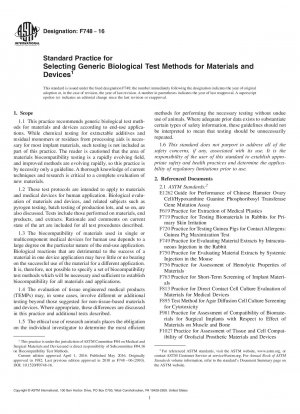ASTM F748-16
Standard Practice for Selecting Generic Biological Test Methods for Materials and Devices
- Standard No.
- ASTM F748-16
- Release Date
- 2016
- Published By
- American Society for Testing and Materials (ASTM)
- Latest
- ASTM F748-16
- Scope
4.1 The objective of this practice is to recommend appropriate biological endpoint assessments (which may or may not require testing) to establish a reasonable level of confidence concerning the biological response to a material or device, while at the same time avoiding unnecessary testing.
4.2 This practice is intended to provide guidance to the materials investigator in selecting the proper procedures to be carried out for the screening of new or modified materials. Because each material and each implant situation involves its own unique circumstances, these recommendations should be modified as necessary and do not constitute the only assessment that will be required for a material. Nor should these guidelines be interpreted as minimum requirements for any particular situation. While an attempt has been made to provide recommendation for different implant circumstances, some of the recommended assessment may not be necessary or reasonable for a specific material or application.
1.1 This practice recommends generic biological test methods for materials and devices according to end-use applications. While chemical testing for extractable additives and residual monomers or residues from processing aids is necessary for most implant materials, such testing is not included as part of this practice. The reader is cautioned that the area of materials biocompatibility testing is a rapidly evolving field, and improved methods are evolving rapidly, so this practice is by necessity only a guideline. A thorough knowledge of current techniques and research is critical to a complete evaluation of new materials.
1.2 These test protocols are intended to apply to materials and medical devices for human application. Biological evaluation of materials and devices, and related subjects such as pyrogen testing, batch testing of production lots, and so on, are also discussed. Tests include those performed on materials, end products, and extracts. Rationale and comments on current state of the art are included for all test procedures described.
1.3 The biocompatibility of materials used in single or multicomponent medical devices for human use depends to a large degree on the particular nature of the end-use application. Biological reactions that are detrimental to the success of a material in one device application may have little or no bearing on the successful use of the material for a different application. It is, therefore, not possible to specify a set of biocompatibility test methods which will be necessary and sufficient to establish biocompatibility for all materials and applications.
1.4 The evaluation of tissue engineered medical products (TEMPs) may, in some cases, involve different or additional testing beyond those suggested for non-tissue-based materials and devices. Where appropriate, these differences are discussed in this practice and additional tests described.
1.5 The ethical use of research animals places the obligation on the individual investigator to determine the most efficient methods for performing the necessary testing without undue use of animals. Where adequate prior data exists to substantiate certain types of safety information, these guidelines should not be interpreted to mean that testing should be unnecessarily......
ASTM F748-16 Referenced Document
- ASTM E1262 Standard Guide for Performance of Chinese Hamster Ovary Cell/Hypoxanthine Guanine Phosphoribosyl Transferase Gene Mutation Assay
- ASTM F1027 Standard Practice for Assessment of Tissue and Cell Compatibility of Orofacial Prosthetic Materials and Devices
- ASTM F1408 Standard Practice for Subcutaneous Screening Test for Implant Materials
- ASTM F1439 Standard Guide for Performance of Lifetime Bioassay for the Tumorigenic Potential of Implant Materials
- ASTM F1877 Standard Practice for Characterization of Particles
- ASTM F1903 Standard Practice for Testing for Biological Responses to Particles In Vitro
- ASTM F1904 Standard Practice for Testing the Biological Responses to Particles In Vivo
- ASTM F1983 Standard Practice for Assessment of Compatibility of Absorbable/Resorbable Biomaterials for Implant Applications
- ASTM F1984 Standard Practice for Testing for Whole Complement Activation in Serum by Solid Materials
- ASTM F2065 Standard Practice for Testing for Alternative Pathway Complement Activation in Serum by Solid Materials
- ASTM F2147 Standard Practice for Guinea Pig: Split Adjuvant and Closed Patch Testing for Contact Allergens
- ASTM F2148 Standard Practice for Evaluation of Delayed Contact Hypersensitivity Using the Murine Local Lymph Node Assay (LLNA)
- ASTM F2382 Standard Test Method for Assessment of Circulating Blood-Contacting Medical Device Materials on Partial Thromboplastin Time (PTT)
- ASTM F619 Standard Practice for Extraction of Medical Plastics
- ASTM F719 Standard Practice for Testing Biomaterials in Rabbits for Primary Skin Irritation
- ASTM F720 Standard Practice for Testing Guinea Pigs for Contact Allergens: Guinea Pig Maximization Test
- ASTM F749 Standard Practice for Evaluating Material Extracts by Intracutaneous Injection in the Rabbit
- ASTM F750 Standard Practice for Evaluating Material Extracts by Systemic Injection in the Mouse
- ASTM F756 Standard Practice for Assessment of Hemolytic Properties of Materials
- ASTM F763 Standard Practice for Short-Term Screening of Implant Materials
- ASTM F813 Standard Practice for Direct Contact Cell Culture Evaluation of Materials for Medical Devices
- ASTM F895 Standard Test Method for Agar Diffusion Cell Culture Screening for Cytotoxicity
- ASTM F981 Standard Practice for Assessment of Compatibility of Biomaterials for Surgical Implants with Respect to Effect of Materials on Muscle and Bone
ASTM F748-16 history
- 2016 ASTM F748-16 Standard Practice for Selecting Generic Biological Test Methods for Materials and Devices
- 2006 ASTM F748-06(2010) Standard Practice for Selecting Generic Biological Test Methods for Materials and Devices
- 2006 ASTM F748-06 Standard Practice for Selecting Generic Biological Test Methods for Materials and Devices
- 2004 ASTM F748-04 Standard Practice for Selecting Generic Biological Test Methods for Materials and Devices
- 1998 ASTM F748-98 Standard Practice for Selecting Generic Biological Test Methods for Materials and Devices

Copyright ©2024 All Rights Reserved